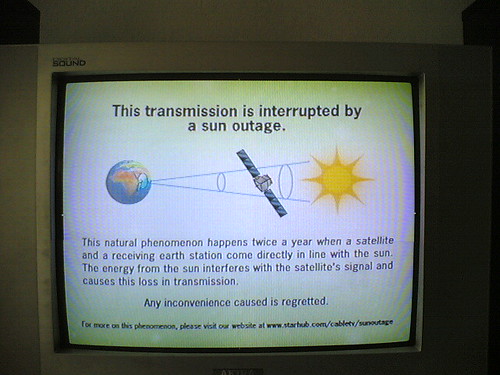DIY Friday: Sun Outage Calculator

There is no greater tool for DIY enthusiasts than the Internet, and today’s DIY activity is just a click away: a sun outage calculator!
But wait — what’s a sun outage? Now’s a good time to ask.
Sun outage is a natural phenomenon, which occurs twice a year (in the spring and fall) when the sun appears to be passing directly behind the satellite as seen from a receiving earth station.
Since the sun is a potent source of radio frequency energy, the earth station’s receivers are overwhelmed by the sun’s “noise” output and reception becomes impossible for a brief period of time, usually less than 10 minutes.
An observer at the earth station will notice that the antenna feed’s shadow will fall exactly in the center of the reflector during the peak of the sun outage period. This indicates that the antenna, the satellite and the sun are in direct alignment. At this point in time, the sun’s radio signals are being focused directly into the antenna’s receive feed. This results in a temporary degradation in the signal to noise ratio of the signal being received from the satellite and a consequent degradation in Eb/N0 (Energy per bit over Noise referenced to zero) in digital systems.
Sun outage generally occurs between 9 AM and 3 PM for locations in the continental United States. The duration and intensity of the outage will begin as a slight degradation in signal, increasing to a peak level over several days and will then begin to reduce in intensity and duration over a similar period. These outages pose no danger to earth station equipment and they are not related to sunspot activity.
So how do you predict when the sun is going to mess up your signal? This sun outage calculator gives you predictions based upon the satellite you’re receiving from, your location on earth, and the time and date.
SES also offers a bunch of charts (good luck with that). Intelsat also offers marginally useful maps of sun outages for spacecraft — but they let you input your exact location. I like that.
Tags: eclipse season, satellite outage, sun outage
Well I really liked studying it. This tip procured by you is very useful for accurate planning.